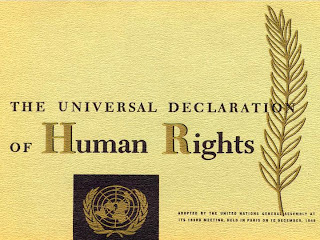 The human rights resolution introduced on 13 March came back to the full CND plenary session for debate Friday evening, and was debated for several hours. As with the debate in the Committee of the Whole on Thursday, China, Pakistan, Thailand, Egypt and Japan led the attack against the resolution.
The human rights resolution introduced on 13 March came back to the full CND plenary session for debate Friday evening, and was debated for several hours. As with the debate in the Committee of the Whole on Thursday, China, Pakistan, Thailand, Egypt and Japan led the attack against the resolution.
Countries including the UK, Argentina, Uruguay and Italy continued to strongly support the resolution.
The title of the resolution, and the wording of operational paragraph 2 (“OP2”), that requested cooperation between UNODC and the Office for the High Commissioner for Human Rights and/or other international bodies, were the major points of contention.
Significantly, Uruguay broke with the so-called “spirit of Vienna” (i.e. that all decisions at CND are made by consensus) and requested that the matter be put to a vote. This would have stopped the obstructionist tactics of the small number of countries speaking against the resolution. This call was made following a technical ploy by Thailand to bump the debate on the resolution to the bottom of the list, an attempt to essentially defer debate until the plenary ran out of time, effectively killing the resolution.
In the end this ploy failed and the resolution did come back for debate, and was adopted by consensus with some significant changes to the text.
The original title of the resolution, “Proper integration of the United Nations human rights system with international drug control policy”, was changed to "Strengthening cooperation between the UNODC and other UN bodies, including the human rights agencies in accordance with Article 2 of the 1998 UNGASS Political Declaration".
OP2 was also rewritten. It originally stated that CND “Requests the United Nations Office on Drugs and Crime to work closely towards those ends [i.e. ensuring drug control activities conform with international human rights law] with the Office of the United Nations High Commissioner for Human Rights and the special procedures of the Human Rights Council” to read instead that CND "Requests, in furtherance of this resolution, the UNODC within its existing mandate to continue to work closely with competent UN organs including UN human rights agencies".
A paragraph referring to the UN Declaration on Rights of Indigenous Peoples was also a source of debate. Canada, which along with the U.S., Australia and New Zealand had (unsuccessfully) opposed the Declaration itself before the UN General Assembly last year, had spoken against the paragraph in the debate on Thursday.
During Friday’s debate, Bolivia proposed to insert "noting where applicable the UN Declaration on the Rights of Indigenous Peoples..." (i.e., language that would have been an out for those countries that have not endorsed the Declaration). Canada and US refused to agree to this language, as did France. In the end Bolivia backed down, saying it wanted to respect the spirit of consensus, but wanted it noted on record that it opposed removal of this reference and proposed that these issues be addressed in working group(s) as part of UNGASS review. Cuba also wanted it noted in the report its concerns.
So, in the end, the CND adopted a human rights resolution that supports UNODC collaboration with UN human rights bodies. While the final language was watered down, it still represents a significant event for a UN body that has never brought discussions of human rights into its work. Clearly this weakened resolution alone is insufficient, given the scale of human rights abuses related to drug policy worldwide, but it does provide a basis for continued advocacy on human rights issues within the international drug control system.
The HR2 blog will publish the full text of both the original and final resolution when it is available.
(Thanks to Richard Elliott of the Canadian HIV/AIDS Legal Network and Rebecca Schleifer of Human Rights Watch for their reporting on Friday night's CND debate)
Tuesday, 18 March 2008
CND passes a ground-breaking - yet watered down - human rights resolution
Friday, 14 March 2008
“Discussion of political issues such as human rights are inappropriate at CND” – China leads charge against human rights resolution
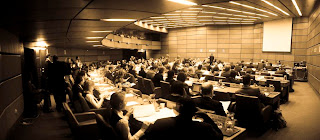 Call it revenge of the death penalty states.
Call it revenge of the death penalty states.
Only days after UNODC Executive Director, Antonio Maria Costa, used his opening speech at the 51st session of the Commission on Narcotic Drugs to raise the issue of human rights and call for an end to the death penalty for drug offences, a coalition of death penalty countries banded together to seek to block a ground-breaking human rights resolution.
The resolution - entitled “Proper integration of the United Nations human rights system with international drug control policy”- was introduced by Uruguay with the co-sponsorship of Bolivia, Argentina and Switzerland. The first resolution of its kind at CND, it recognised the 60th anniversary of the Universal Declaration of Human Rights (an event being celebrated throughout the UN system during 2008) and affirmed "that international drug control activities must be conducted in conformity with international human rights law". The resolution requested UNODC "to work closely towards those ends with the Office of the High Commissioner for Human Rights and...the Human Rights Council."
On Thursday 13 March, this draft resolution was taken to the "Committee of the Whole" at CND, where the wording of draft resolutions is debated, amended and (hopefully) agreed by consensus before being brought back to the full CND plenary session for approval. It was here that a small coalition of states sought to block, or at least undermine, the resolution.
Leading the charge was China, which stated that “Discussion of political issues such as human rights are inappropriate at CND”. China questioned whether it was within the mandate of CND to celebrate the 60th anniversary of the Universal Declaration, and stated that “It is not appropriate to address human rights within the mission of CND, and it is not appropriate to address this resolution in this session.”
Joining China in opposing even consideration of the resolution were Japan, Nigeria, Iran and Thailand. Cuba ensured that a specific statement against the death penalty for drug offences was removed from the draft before it even reached committee debate.
Speaking in full support of the resolution were Uruguay, the UK, Italy, Bolivia, Argentina, Romania, France, the Netherlands, Norway, Belgium, Switzerland, Finland, Germany, Spain, Slovenia, Ireland and Peru.
The United States, although stating that “We are all very passionately committed to human rights”, did its best to water down the wording of the resolution as much as possible. This was a similar approach to that taken by Egypt, which while not speaking directly in opposition to the resolution introduced numerous procedural and wording changes intended to dilute its human rights focus. Canada expressed support for the resolution, although later joined the US in blocking reference within it to the UN Declaration on the Rights of Indigenous Peoples.
The audience observing the debate was treated to some often unbelievable statements from delegates officially representing their governments at a high level UN meeting.
China, for example, stated that "It is ridiculous to require us [meaning the CND] to work in accordance with human rights law."
Nigeria told the delegations that "We should not be carried away by sentiment” in supporting the resolution, and asked "What do we mean by the United Nations human rights system?”
Not to be outdone in the "Who knows least about the UN system" contest, Japan asked what the term "international drug control" meant in the resolution, then questioned whether the Universal Declaration of Human Rights is international law. (It is, and for the information of our distinguished Japanese colleagues they can find out more about it on the International Law section of the Office of the High Commissioner of Human Rights website.)
Thailand worried that discussion of human rights was the job of the UN in Geneva (where the human rights offices are located) rather than Vienna (where CND meets). The Thai delegation stated that “If we bring in the issue of human rights within CND, it will disrupt the tradition of consensus" decision-making within the Commission.
On the second point at least IHRA couldn't agree more, which is why our statement before the CND plenary on Tuesday called for an end to consensus, and the use of majority voting, on human rights issues. This would end the type of ridiculous scenario witnessed on Thursday when a small handful of countries were allowed to block a resolution that would have easily passed if voted on.
On the other side, the UK delegation played a leading role in defending the resolution, pointing out that the primacy of human rights over drug control within international law was "clear and unambiguous". They stated that as a functional commission of the Economic and Social Council of the UN, human rights is squarely within CND's mandate. The UK also clarified for the benefit of the Japanese delegation that not only is the Universal Declaration international law, it "verges on customary law".
The Netherlands delegation noted that the issue of human rights was “Important enough for Executive Director Costa to bring it up in his opening, so I see no reason why we should not discuss it here.” In reply to statements from some of the resolution's opponents who claimed not to know what the term human rights meant, the delegate stated that “Human rights are very well defined, so I don’t see why people would ask what are human rights.”
Switzerland, one of the resolution's co-sponsors, argued that “Human rights are not just something we defend in Geneva or a goal we seek to attain. They are a profound belief at the heart of the UN system.”
Argentina, another co-sponsor, stated that one of the main aims of the international community is the promotion of Universal Declaration, which it described as "one of the great achievements of the international community". They pointed out that drug control is a very broad field that touches on many areas of human rights protections, including the right to health and the right to life.
Bolivia argued that the resolution was important so that "fundamental human rights are not lost sight of in the fight against drugs".
The resolution, with new wording based upon this debate, is due to come back to the Committee of the Whole on Friday. The HR2 blog will be there and will keep you posted.
Thanks to Steve Rolles of Transform Drug Policy Foundation for the photo of the CND Committee of the Whole.
Thursday, 13 March 2008
CND day 4 - INPUD statement before plenary session
This morning, Stijn Goossens of the International Network of People who Use Drugs (INPUD) gave the following statement on the promotion of health and human rights of people who use drugs during the Commission on Narcotic Drugs plenary debate in Vienna.
"Thank you, Mr Chairman, for allowing me a slot to speak, and to the Commission and its secretariat for expanding the opportunities for Civil Society organizations to contribute to these debates, and to the discussions at the CND in general.
I speak here as civil society representative on the delegation of the International Harm Reduction Association and as spokesman for the International Network Of People Who Use Drugs (INPUD). Also I am a member of the UN Civil Society Task Force that's preparing the High-Level Meeting on AIDS to be held in New York June, 10-11, representing one of UNAIDS named key-population: the people who use drugs. Maybe this is difficult to grasp but we beg the Commission and the organizations present here to open their hearts and minds to our words.
Civil Society organizations have an important contribution to make in this area of policy. Civil society involvement can help to improve the policy discussions and help governments to engage with, and have the direct and valuable input from, representatives of organizations of people who use drugs, academics, drug policy analysts, farmers organizations and so on.
We are plainly aware of the suffering and harms drugs can cause to individuals and understand the need of drug control, most specially to keep children away from drugs – legal or illegal.
People who use drugs are considered to be a part of the problem. People who use drugs themselves are the most affected by the policies on drugs. Let us be a part of the solution.
In his speech on Monday, Mr Costa talked about a 'stabilization' of the world drug problem, at around 200 million users. We at INPUD do not know how accurate this figure is or whether it is increasing or decreasing. But if it is true then we are talking about 200 million citizens who do not forfeit their humanity and human rights simply because they choose to use substances covered by the international drug control system.
There are not 200 million threats to social order - most of us wish to get on with our lives without harming others.
Some of us have problems with our use, and may need help. We cannot all be treated as criminals. Many of us want to help develop drug policies that are more effective in reducing harm to both users and non-users. This is why INPUD is here.
We believe that the Commission and the other institutions of drug control would greatly benefit from the involvement of People who use drugs as part of the civil society engagement in the process of drugs policy making:
- To work together for improvement and to make more cost-effective the treatment and harm reduction measures for people who use drugs.
- To cooperate closely together in the global fight against AIDS, Hepatitis C and other blood born diseases.
- To avoid peoples unnecessary dying.
- To avoid the unnecessary, but socially harmful and expensive incarceration of people just because of the consumption of drugs that are considered to be illegal.
- To cooperate closely together in the fight against the criminalization, stigma, discrimination and marginalization of people who use drugs and to work together for social inclusion and health.
- And to avoid violations of the human rights of people who use drugs.
Tuesday, 11 March 2008
CND day 2 - IHRA statement on human rights and harm reduction during plenary debate on demand reduction
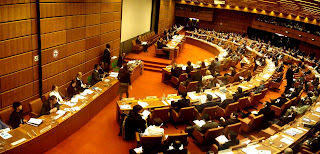 This afternoon, during the second day of the 51st session of the Commission on Narcotic Drugs, IHRA's Senior Policy Advisor, Rick Lines (at bottom left of the photo-click on image to get full size) addressed delegates during a plenary debate on demand reduction.
This afternoon, during the second day of the 51st session of the Commission on Narcotic Drugs, IHRA's Senior Policy Advisor, Rick Lines (at bottom left of the photo-click on image to get full size) addressed delegates during a plenary debate on demand reduction.
A copy of IHRA's statement is below.
"Each December, the UN General Assembly adopts a resolution entitled 'International cooperation against the world drug problem'. This resolution states that drug control activities must be 'carried out in full conformity with the purposes and principles of the Charter of the United Nations and…with full respect for…all human rights and fundamental freedoms'.
This resolution of the UN’s highest policy-setting body directs CND to prioritise human rights. Yet to date, mention of human rights has been almost completely absent from CND’s work. In effect, CND has failed in its obligation to take direction from the General Assembly.
This year agencies across the UN system celebrate the 60th anniversary of the Universal Declaration of Human Rights. And in this year we see hope for change.
We welcome Mr. Costa’s comments yesterday on the need to promote human rights in drug control activities, including the need to end the death penalty for drug offences. We welcome the statement in INCB’s most recent Annual Report that 'Due respect for universal human rights…is important' and that 'Non-respect…can undermine the conventions.'
Such words are important. But words are not enough. True leadership comes only when words are turned into action. We need action from CND to ensure that international human rights law is placed at the heart of its work.
What does human rights leadership from CND mean?
Human rights leadership means taking action to promote the right to health. For example, last year the UN Special Rapporteur on the Right to Health affirmed that the provision of harm reduction programmes is a necessary part of State obligations to fulfill the right to health. In this context, human rights leadership means that CND must robustly and unambiguously support harm reduction measures such as syringe exchange, opioid substitution treatment and safe injecting rooms, among other interventions. It also means ensuring that drug treatment programmes are voluntary and not coercive. It means that statements from drug control bodies like INCB are based on evidence and human rights obligations, and that affirmative action is taken to correct misinformation.
Leadership also means taking action to prevent human rights abuses in the name of drug control before they occur, and speaking out when there is legitimate fear of imminent human rights violations.
For example, in recent weeks, there have been indications from the Royal Thai government that it plans to resume its 'war on drugs'. It is important that UN agencies and Member States seek clarification of the government’s intentions in this regard. However, recent public comments by a government Minister have raised fears among many that the State intends to relaunch the campaign of extrajudicial killings seen in 2003, in which over 2,800 people were killed. This campaign was criticised by the UN Human Rights Committee, among other human rights monitors. Leadership on human rights means that CND and Member States must speak out clearly against abusive 'drug-control' policies wherever they occur.
Leadership on human rights means ensuring that UN-sponsored drug control activities have the promotion of human rights as key performance indicator, one fully integrated into programme planning and evaluation. We enjoin CND to ensure that UN drug control agencies undertake human rights impact assessments of all activities prior to their approval and implementation, as well as during and after the approved activities have begun. Only through such a process of assessment and monitoring can we be certain that UN-sponsored drug enforcement programmes do not result in human rights violations, and that they effectively promote the respect and fulfillment of human rights and the rule of law that is central to the UN’s mission.
Finally, leadership on human rights means using the democratic majority voting mechanism provided for CND under ECOSOC in cases where consensus is not possible on human rights issues, and ending the current status quo where a small handful of Member States are allowed to block human rights language in CND resolutions. This status quo undermines the promotion and protection human rights, a mission fundamental to the object and purpose of the UN. When consensus is not achievable, CND Members must vote and let the world see which States are willing to stand up to support human rights, and which are not.
In this 60th anniversary year of the Universal Declaration of Human Rights, we can no longer allow the 'spirit of Vienna' to undermine the spirit of the Declaration."
Thanks to Steve Rolles at Transform Drug Policy Foundation for the photo.
CND day 1 - War on Drugs does not Justify Rights Violations: New Report Examines Widespread Abuses Due to Drug Control Policies
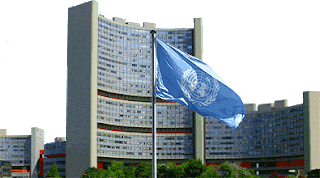 (Vienna, March 10, 2008) – The United Nations must stop the ongoing subversion of human rights in the name of drug control, the International Harm Reduction Association, Human Rights Watch, the Canadian HIV/AIDS Legal Network and the Beckley Foundation Drug Policy Programme said in a joint report released today as the UN Commission on Narcotic Drugs (CND) convenes for its annual meeting to debate global drug policy. The report, Recalibrating the Regime: The Need for a Human Rights-Based Approach to International Drug Policy examines the tensions between the international drug control system and UN human rights standards, highlighting the multiple ways in which the enforcement of drug control prohibition – the dominant approach of the UN system – has led to widespread and serious human rights violations. Yet, despite numerous instances of human rights abuses perpetrated in the name of drug control, there has been little engagement with this issue by bodies such as the International Narcotics Control Board (INCB) and CND or by the human rights treaty bodies.
(Vienna, March 10, 2008) – The United Nations must stop the ongoing subversion of human rights in the name of drug control, the International Harm Reduction Association, Human Rights Watch, the Canadian HIV/AIDS Legal Network and the Beckley Foundation Drug Policy Programme said in a joint report released today as the UN Commission on Narcotic Drugs (CND) convenes for its annual meeting to debate global drug policy. The report, Recalibrating the Regime: The Need for a Human Rights-Based Approach to International Drug Policy examines the tensions between the international drug control system and UN human rights standards, highlighting the multiple ways in which the enforcement of drug control prohibition – the dominant approach of the UN system – has led to widespread and serious human rights violations. Yet, despite numerous instances of human rights abuses perpetrated in the name of drug control, there has been little engagement with this issue by bodies such as the International Narcotics Control Board (INCB) and CND or by the human rights treaty bodies.
The report will be presented during a panel discussion on the worldwide human rights impact of the war on drugs from 1h30 – 15h00 at the Vienna International Centre, 7th floor, Conference Room 2. Speakers will address key issues covered in the report, including the use of the death penalty for drug offenses, barriers to HIV prevention and treatment, and repressive and abusive law enforcement measures.
“The UN General Assembly has stated repeatedly in resolutions that drug control must be carried out in full conformity with, and full respect for, all human rights and fundamental freedoms,” said Mike Trace of the Beckley Foundation, which commissioned the report. “Delegations to this week’s meeting must ensure that their obligations under international human rights law underpin all CND deliberations and actions.”
“Despite the primacy of human rights obligations under the UN Charter, the approach of the UN system and the wider international community to addressing the tensions between drug control and human rights remains ambiguous,” said Richard Elliott of the Canadian HIV/AIDS Legal Network. “This is inexcusable in the face of the egregious human rights abuses perpetrated in the course of enforcing drug prohibition, which in turn damages global efforts to prevent and treat HIV.”
The groups expressed particular concern at the recent public comments by the government of Thailand that it intends to resume former Prime Minister Thaksin Shinawatra’s notorious “war on drugs,” which in 2003 resulted in some 2,800 extra-judicial killings.
“As the UNODC has acknowledged, there are proven methods to address drug use while protecting human rights. Murder is not one of them,” said Rebecca Schleifer, advocate with the HIV/AIDS and Human Rights Program at Human Rights Watch. “As a member of the CND, Thailand must be held to account for its actions on drugs, and pressure brought by the international community to ensure that human rights violations are not repeated.”
“Last week, INCB President Philip Emafo stated in the board’s 2008 annual report that ‘To do nothing [about drugs] is not an option’,” said Rick Lines of the International Harm Reduction Association. “We are here today to state clearly that doing nothing about the human rights abuses perpetrated in the name of the drug war is also not an option. In this, the 60th anniversary year of the Universal Declaration of Human Rights, CND member states and indeed the entire UN family must speak out clearly that human rights must not be sacrificed on the altar of drug control.”
Monday, 10 March 2008
CND day 1 - UNODC chief calls for end to the death penalty for drug offences and a greater focus on human rights
 The International Harm Reduction Association has welcomed today's statement by UNODC Executive Director, Antonio Maria Costa, calling for an end to capital punishment for drug offences, and a greater focus on human rights in drug enforcement activities.
The International Harm Reduction Association has welcomed today's statement by UNODC Executive Director, Antonio Maria Costa, calling for an end to capital punishment for drug offences, and a greater focus on human rights in drug enforcement activities.
Speaking this morning at the opening session of the 51st Commission on Narcotic Drugs (CND) meeting in Vienna, Mr. Costa said:
"Finally, but certainly not least, human rights. Our work is guided first and foremost by the UN Charter that commits signatories to fundamental freedoms, and by the Universal Declaration of Human Rights, 60 years old this year.
In Article 25 of the Universal Declaration, health is listed as a basic human right. As we emphasize the health aspects of drug control, it stands to reason that implementation of the drug Conventions must proceed with due regard to human rights. Thus far, there has been little attention paid to this aspect of our work. This definitely needs to be amended.
Although drugs kill, I don't believe we need to kill because of drugs.
The UN drug Conventions have left it to individual states to deal with health care and crime retribution, in relation with specific cultural and judicial contexts. Mindful of this, today I propose that Member States extend the concept of harm reduction to include the need to give serious consideration to whether the imposition if capital punishment for drug-related crimes is a best practice.
The recent General Assembly moratorium suggests a way forward. More must be done to bridge the gap between international standards and the right of individual nations to decide in this difficult area. As the custodian of the judicial standards and norms set by the World Crime Congresses, UNODC insists on the importance of translating them into national laws and practice."
IHRA's HR2 programme has been doing extensive work on the issue of the death penalty for drugs over the past year, including publishing a major report in December and meeting with Mr. Costa in Vienna in February. Later today, IHRA's Senior Policy Advisor, Rick Lines, will be speaking on the death penalty for drugs at a CND luncheon briefing session on human rights organised by NGOs.
Wednesday, 5 March 2008
HIV? Human Rights Abuses?...The INCB Has More Pressing Concerns
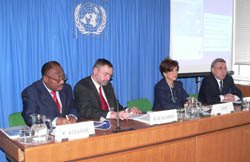 Today, Hamid Ghodse and Philip Emafo of the International Narcotics Control Board launched a media offensive in the UK as part of the release of INCB’s 2007 Annual Report. Appearing on Channel 4 News, Channel 5 News, the BBC website and the front page of this morning’s London Metro, both Board members raised their concerns as UN drug control 'experts' on what they see as an issue of key importance.
Today, Hamid Ghodse and Philip Emafo of the International Narcotics Control Board launched a media offensive in the UK as part of the release of INCB’s 2007 Annual Report. Appearing on Channel 4 News, Channel 5 News, the BBC website and the front page of this morning’s London Metro, both Board members raised their concerns as UN drug control 'experts' on what they see as an issue of key importance.
Here is a hint:
It is not ensuring access to harm reduction services to prevent HIV and hepatitis C transmission through injecting drug use and to ensure the right to health of all people who use drugs.
It is not ensuring access, for everyone in need, to opiates for pain relief, including those with terminal diseases.
It is not raising their concerns about a possible reinstatement of the ‘war on drugs’ in Thailand which, in 2003, claimed the lives of over 2,500 people through extrajudicial killings.
No, the United Nations body responsible for overseeing the international drug control conventions is worried about celebrities using drugs, claiming that dealing with famous people in a lenient manner encourages a permissive attitude to drugs among young people.
There are a number of extremely troubling aspects to the Board’s position in this regard.
Firstly, an international body geared towards monitoring the three UN drug control conventions has far more pressing concerns than what Kate Moss is snorting or Amy Winehouse is smoking. Thirty percent of all HIV infections, excluding Sub-Saharan Africa, are through unsafe injecting drug use, an issue that is all but ignored in the report apart from some mentions of harm reduction without positive commentary. The Board visited Brazil in 2007 and the country features in this year’s report. Yet there is no mention of the hundreds of deaths in the favelas through indiscriminate police violence. The INCB also visited Viet Nam in 2007, but has not mentioned the all too common application of the death penalty for drug offences in violation of international human rights law.
Secondly, the Board has created a new category of offender, the ‘celebrity user’, one to be made an example of for the benefit of the greater good, something that is completely outside its mandate under the conventions. Indeed the INCB presents no evidence that celebrities are treated more leniently in the first place. This also runs contrary to the ostensible commitment to ‘equality before the law’ focused on in this year’s annual report.
Thirdly, what Ghodse and Emafo are saying, in effect, is that we should criminalise drug users, a position entirely contradictory to the first chapter of the INCB Annual Report, which calls for a focus on traffickers and not individual users.
This aspect of the Annual Report has been, until now, all but overlooked, with organisations such as TNI and IDPC rightly focusing on the more pressing issues of human rights and harm reduction.
Today’s publicity, however, cannot be ignored. The International Narcotics Control Board should be worried less about soundbites and more about the real issues and the lives of millions affected by their work.
Tuesday, 4 March 2008
Recalibrating the Regime: Drug Control, Health and Human Rights - A panel and discussion on critical human rights and public health challenges
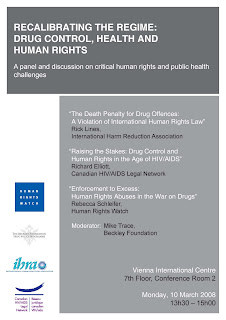
On Monday, March 10th the International Harm Reduction Association, Human Rights Watch, the Canadian HIV/AIDS Legal Network and the Beckley Foundation Drug Policy Programme will be hosting a luncheon panel discussion on human rights during the 51st session of the UN Commission on Narcotic Drugs meeting in Vienna.
Presentations will include "The Death Penalty for Drug Offences: A Violation of International Human Rights Law" (Rick Lines, IHRA), "Raising the Stakes: Drug Control and Human Rights in the age of HIV/AIDS" (Richard Elliott, Canadian HIV/AIDS Legal Network) and "Enforcement to Excess: Human Rights Abuses in the War on Drugs" (Rebecca Schleifer, Human Rights Watch).
The event will take place on Monday March 10th from 13h30 - 15h00 at the Vienna International Centre, 7th floor, Conference Room 2. All are welcome.
Monday, 3 March 2008
Recalibrating the Regime: The Need for a Human Rights-Based Approach to International Drug Policy - Beckley Foundation Report 13
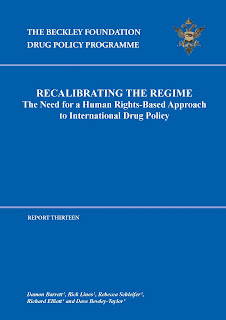
This new report, co-authored by the HR2 team, looks at the tensions between some aspects of the global drug control system and international human rights law. The report highlights that, despite numerous instances of human rights abuses perpetrated in the name of drug control, there has been little engagement with this issue by the responsible bodies, the UNODC, INCB and the human rights treaty bodies.
The report was published by the Beckley Foundation Drug Policy Programme, and is co-authored by IHRA, Human Rights Watch and the Canadian HIV/AIDS Legal Network.


